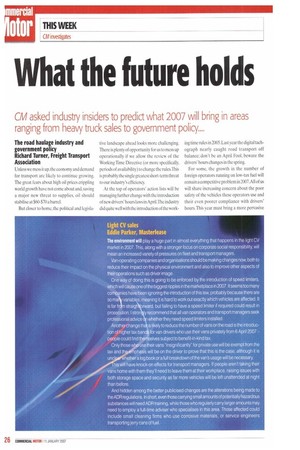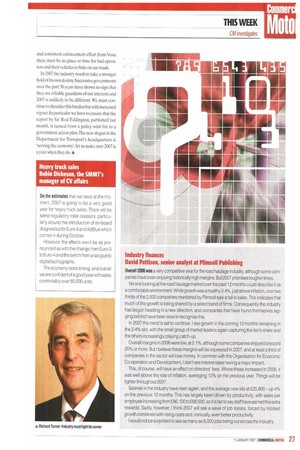What the future holds
Page 26

Page 27

If you've noticed an error in this article please click here to report it so we can fix it.
CM asked industry insiders to predict what 2007 will bring in areas ranging from heavy truck sales to government policy....
The road haulage industry and government policy Richard Turner, Freight Transport Association
Unless we mess it up, the economy and demand for transport are likely to continue growing. The great fears about high oil prices crippling world growth have not come about and, saving a major new threat to supplies, oil should stabilise at $6{)-$70a barrel.
But closer to home, the political and legisla tive landscape ahead looks more challenging. There is plenty of opportunity for us to mess up operationally if we allow the review of the Working Time Directive (or more specifically, periods of availability) to change the rules.This is probably the single greatest short-term threat to our industry's efficiency.
At the top of operators' action lists will be managing further change with the introduction of new drivers hours laws in April.The industry did quite well with the introduction of the work ing time rules in 2005. Last year the digital tachograph nearly caught road transport off balance; don't be an April Fool, beware the drivers' hours changes in the spring.
For some, the growth in the number of foreign operators running on low-tax fuel will remain a competitive problem in 2007.All of us will share increasing concern about the poor safety of the vehicles these operators use and their even poorer compliance with drivers' hours. This year must bring a more pervasive and consistent enforcement effort from Vosa: there must be no place or time for bad operators and their vehicles to hide on our roads.
In 2007 the industry needs to take a stronger hold of its own destiny. Successive governments over the past 30 years have shown no sign that they are reliable guardians of our interests and 2007 is unlikely to be different. We must continue to shoulder this burden but with increased vigour. In particular we have to ensure that the report by Sir Rod Eddington, published last month, is turned from a policy wish list to a government action plan.The new slogan in the Department lbr Transport's headquarters is 'serving the economy': let us make sure 2007 is a year when they do. •
Heavy truck sales Robin Dickeson, the SMMT's manager of CV affairs
On the estimates that we have at the moment, 2007 is going to be a very good year for heavy truck sales. There will be some regulatory roller coasters, particularly around the introduction of on-board diagnostics for Euro-4 and AdBlue which comes in during October.
However, the effects won't be as pronounced as with the change from Euro-3 to Euro-4 and the switch from analogue to digital tachographs.
The economy looks strong, and overall we are confident of a good year with sales comfortably over 50,000 units.
Industry finances David Pattison, senior analyst at Plimsoll Publishing
Overall 2006 was a very competitive year for the road haulage industry, although some companies have been enjoying historically high margins. But 2007 promises tougher times.
No one looking at the road haulage market over the past 12 months could describe it as a comfortable environment. While growth was a healthy 3.4%, just above inflation, over two thirds of the 2,000 companies monitored by Plimsoll saw a fall in sales. This indicates that much of the growth is being shared by a select band of firms. Consequently the industry has begun heading in a new direction, and companies that have found themselves lagging behind have been slow to recognise this.
In 2007 this trend is set to continue. I see growth in the coming 12 months remaining in the 2-4% slot, with the small group of market leaders again capturing the lion's share and the others increasingly playing catch-up.
Overall margins in 2006 were low, at 2.1%, although some companies enjoyed a record 20% or more. But I believe these margins will be squeezed in 2007, and at least a third of companies in the sector will lose money. In common with the Organisation for Economic Co-operation and Development, I don't see interest rates having a major impact.
This, of course, will have an effect on directors' fees. Where these increased in 2006, it was well above the rate of inflation, averaging 12% on the previous year. Things will be tighter throughout 2007.
Salaries in the industry have risen again, and the average now sits at £25,900up 4% on the previous 12 months. This has largely been driven by productivity, with sales per employee increasing from £86,100 to £88,500, so it is fair to say staff have earned the extra rewards. Sadly, however, I think 2007 will see a wave of job losses, forced by modest growth combined with rising costs and, ironically, even better productivity.
I would not be surprised to see as many as 8,000 jobs being cut across the industry.










































































































































































